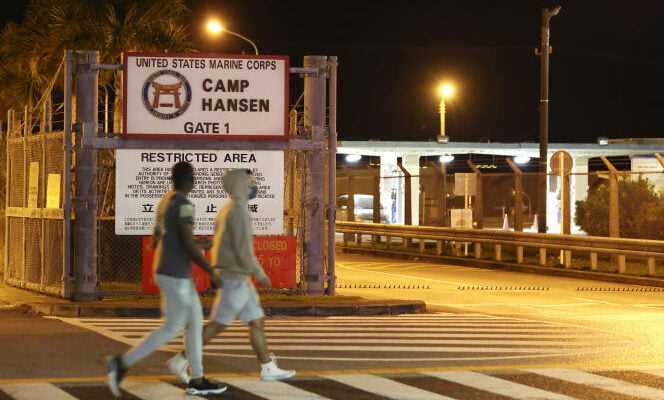The spread of the Omicron variant in Japan rekindles debates on the special status enjoyed by the US military stationed in the Archipelago. Judged in part responsible for the new wave, these soldiers accepted, late and after multiple requests from the Japanese government, to restrict, from Monday January 10 and ” for two weeks “, their activities “Non-essential” off the bases. They also reinstated the compulsory wearing of masks outdoors and tests for personnel arriving from abroad.
Japanese Foreign Minister Yoshimasa Hayashi had previously “Insisted on strengthening preventive measures” and the government spokesperson, Hirokazu Matsuno, had expressed his “Strong concerns” on the situation on the bases, while Japan is experiencing a resurgence of contamination on a national scale, 6,436 cases of Covid-19 on January 10, against 574 on the 1er January.
The US military is suspected of contributing to the rebound of the epidemic in the country, because most of the cases come from Okinawa (south). This small archipelago is home to more than 60% of Japan’s 50,000 GIs. The first contaminations of the last wave would have been detected at the end of December on the American base of Camp Hansen. On January 8, Okinawa recorded 1,759 cases in one day, a record since the start of the pandemic, in this prefecture of 1.5 million inhabitants, which does not include the cases of the American bases, which amounted to 547 the same day. The governor, Denny Tamaki, a supporter of the reduction of American forces in his department, expressed his ” anger “ in front of the “Alarming rise” contaminations.
The prefecture of Yamaguchi (southwest), where the American base of Iwakuni is located, and its neighbor of Hiroshima are experiencing a similar situation.
Special status in question
This has serious consequences since 485 doctors and nurses in Okinawa contact cases have had to stop work, while the occupancy rate of beds reserved for Covid-19 is increasing rapidly. Okinawa, Yamaguchi and Hiroshima reimposed, on January 9, restrictions on the opening of bars and restaurants and called on the population to limit travel.
The situation has revived questions about the Status of Forces Agreement (SOFA), defined in 1960, when the bilateral security treaty was signed. This framework offers a quasi-extraterritoriality to American bases and a impunity to the military, a factor of discontent with each news item involving an IM. Article 8 of the SOFA also exempts them from the procedures imposed at the borders, including, therefore, the strict rules of quarantine and tests imposed by Tokyo.
You have 27.28% of this article to read. The rest is for subscribers only.
